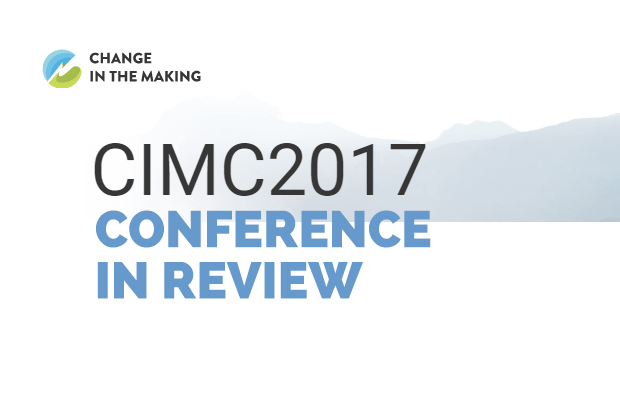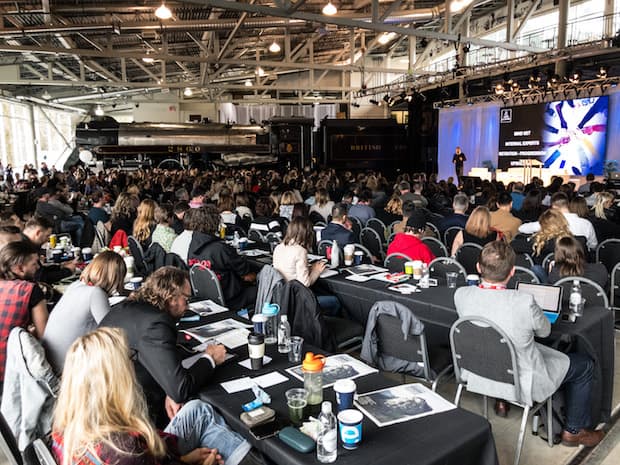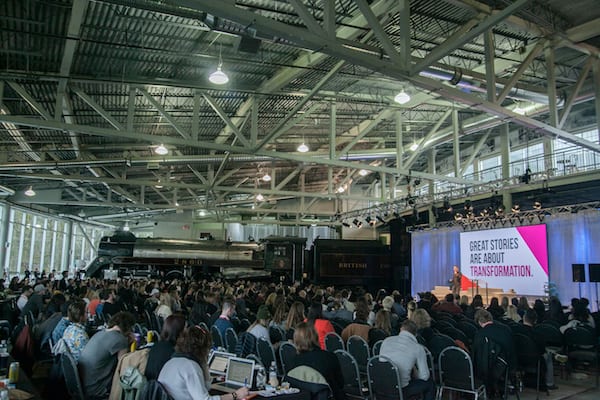CIMC, Change in the Making Conference is Western Canada’s biggest marketing and PR conference. Arriving in the world’s biggest stock photo hub, Squamish, BC, it’s clear what draws the big names to attend the conference. No, it’s not just the stunning, picturesque scenery. It’s for learning about the latest trends and meeting like-minded disrupters and influencers in the industry.
At this year’s CIMC, innovative leaders shared their stories with an audience of PR and marketing professionals. Here are the highlights:
Drive Your Career
General Motors is a company that understands the need to be a disruptor in their space. “It helped to go bankrupt,” says GM’s Ted Graham. “Companies like Airbnb and Uber started during the recession. But they didn’t go away when the recession ended. People started really connecting with them and they became part of their experiences.”
Graham took research to the next level when he signed up to drive for Uber. “I drove for Uber to experience how the company was disrupting the market,” he explains. “I wanted to see what the interactions were like. I wanted to see how they enforced the rules. I was receiving data in real time all the time.”
It’s a brilliant move that marketers can take inspiration from. If you want to work out how to disrupt the market, reverse engineer how someone else is doing it and what impact it makes. Today, GM pride themselves on being disruptive. And it’s this desire to disrupt and ask “how can I create new opportunities?” that Graham suggests marketers use to drive their careers.
Think About Risks and Opportunities
“By 2020 there will be more than 21 billion devices connected to the internet,” says VISA’s Nick Lopez. “That’s three devices for every person on the planet. And each have possibility for point of scale.”
An avid user of Google Play, Lopez described his delight in location-based playlist selections. And it’s this ability to personalize that’s really exciting about the future of shopping. “Customised experiences and communications will become an expectation,” says Lopez. “My expectation is now that Google knows what music I want to play. I can’t wait for my fridge to connect with my calendar and know that I’m hosting friends of Friday and buy beer ahead of time.”
How do we get there? We have to make it make it easy for the consumer to give us their money and we have to be acutely aware of innovations in the brand place. Staying on top of trends and adjusting your strategy to follow them will ensure you’re not left behind.
“Reducing the payment friction to turn browsers into buyers will be a competitive advantage,” says Lopez. “Think about the risks and opportunities. You don’t want to be Blockbuster Video. Think about the shows that you’re watching that seem completely far fetched. They might be a reality in 20 or 30 years.”
Image of Squamish from Shutterstock
Understand Your Audience
In the panel chats throughout the two day conference, we heard one phrase repeated again and again, “know your audience.”
“Understand where and why your customer is coming from,” says Cineplex Entertainment’s Katelyn Crawford. “60% access our site through mobile phones. That influences how we structure our experience. Think about how you can curate the experience—how is the audience accessing us, how can we keep their attention?”
If you think you’re good today and you take it for granted, you’re going to be bad tomorrow
Getting data on the audience is crucial to understand and resonate with them. Buzzfeed’s Lindsay Stewart says, “Buzzfeed publishes 700 pieces of content a day globally to get data. We put it out there and create a feedback loop. We want to know what people are sharing and commenting on. It’s an ongoing conversation with the audience.”
Speaking in a Panel on the Future of Digital and Shopping, Shopify’s Liz Couto spoke about meeting your audience through personalization. “Our attention spans are so small and we have so many options. Understand your audience, their pain points, how they make decisions. I don’t want to be overwhelmed. Tailor as much to me or you’ll lose me as a customer.”
Don’t Be afraid to Completely Reinvent Yourself
L’Oreal is a company at the top of their game. They have never had a year without growth. Three years ago, they decided they needed to do everything differently — the way they hired, the way the went to market, the way they managed their P&L.
Stéphane Bérubé, L’Oreal Canada’s Vice-President, Chief Marketing Officer described how the company shifted from ‘product focussed’ to ‘consumer focussed.’ Today, the team spend zero dollars on their media for their top five brands, preferring to let the audience drive the content.
For Bérubé, staying at the top of the game means keeping your skills sharp. “If you think you’re good today and you take it for granted, you’re going to be bad tomorrow,” he explains. “I don’t want to be in a position three years from now where everyone’s using bots and I’m not. If your company doesn’t encourage innovation, leave tomorrow. Find the place to create it.”
Choose Optimism
Canada has the second highest density of startups in the world, second to Silicon Valley. Google Canada’s Meagan Tanner’s inspiring keynote focussed on thinking and acting globally. She championed building the North, and choosing optimism.
Tanner’s passion is about helping local business owners achieve results. As part of Google, she is helping small businesses go from good to great. Talking about how Canada is suddenly hip, Tanner made a case that the future is technology.
What an incredible keynote by Meagan from @googlecanada on building the North! It’s hard, but choose optimism. 🇨🇦 #CIMC2017 pic.twitter.com/EIkXTubBVI
— CIMC (@CIMConference) April 6, 2017
“When there are bombs being built, we need to step up to build something better,” says Meagan. “It’s hard, but choose optimism.”
How do we do that? We embrace tech and embrace change. “The choices we make as digital evangelists today, will not only change our community, but it’ll change the world. In a climate of divisiveness, the world needs more Canada.”
Don’t be Clever. Be Vulnerable
Winner of the speaker-who-made-me-cry award goes to Pixar storyteller, Matthew Luhn, for showing a Mercedes Benz ad about relationships, not how fast a car can go. For a brand, being memorable is everything and storytelling is the skill that makes that possible. It’s a skill that great leaders, like Steve jobs have. Why is it so meaningful? Because stories are “memorable, impactful, and personal,” says Luhn.
Storytelling should have five key elements: a good hook, transformation, a connection with the audience, authenticity, and structure. There are great opportunities for any brand to tell its story, whether that’s a personal moment where you’ve had success, or where you’ve completely transformed your approach.
One thing all great stories have one thing in common according to Luhn, is heart. “Don’t be clever,” he urges. “Be vulnerable and honest. Speak from your heart. The best leaders, the best directors speak from the heart.”
Stay Relevant; Stay Hungry
The biggest takeaway from the conference? Change is constant and staying relevant is crucial. If I’ve taken one thing away from CIMC2017, it’s that life-long learning is paramount. Time to book that course… just one thing to consider. Should it be Hootsuite Education, Camp Tech, Red Academy, or Lighthouse Labs?
Did you go to CIMC2017? Who were your favourite speakers? What were your biggest takeaways? We’d love to hear from you! Let us know in the comments below.



